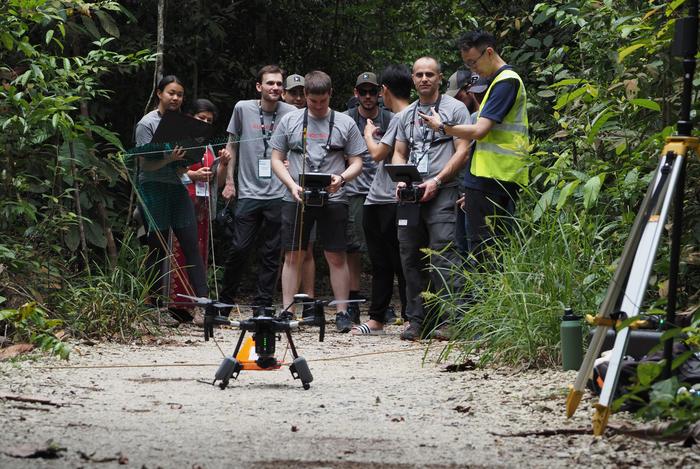CHICAGO—July 25, 2023—Matthew Spenko, professor of mechanical and aerospace engineering at Illinois Institute of Technology, is leading his team, Welcome to the Jungle, into the finals of the prestigious XPRIZE Rainforest competition—a global five-year, $10 million contest designed to enhance our understanding of tropical rainforest ecosystems around the world. Welcome to the Jungle—composed of members from Illinois Tech, Purdue University, Natural State, and the Morton Arboretum—is one of six teams advancing to the finals, which will be held in 2024.

Credit: Cat Kutz/XPRIZE
CHICAGO—July 25, 2023—Matthew Spenko, professor of mechanical and aerospace engineering at Illinois Institute of Technology, is leading his team, Welcome to the Jungle, into the finals of the prestigious XPRIZE Rainforest competition—a global five-year, $10 million contest designed to enhance our understanding of tropical rainforest ecosystems around the world. Welcome to the Jungle—composed of members from Illinois Tech, Purdue University, Natural State, and the Morton Arboretum—is one of six teams advancing to the finals, which will be held in 2024.
“We are extremely excited to be part of the XPRIZE Rainforest competition finals. The semifinal field trials in Singapore showed us how difficult this challenge is, and we’re ready to implement everything we learned there into our approach for the finals,” says Spenko, whose team was one of 13 semifinalists. “We also got a glimpse at how impressive the competition is and are looking forward to seeing more next year.”
The team’s innovative approach involves delivering and retrieving sensor packages to the rainforest and 3D mapping the rainforest seamlessly using drones. These sensors are designed to identify species, particularly birds, from audio and visual data. Spenko’s partners at Purdue University, led by Professor Jinha Jung, took the lead on aerial surveying to measure vegetation, quantify tree species’ diversity and determine potential sensor deployment locations.
“Working collaboratively, our team has been able to obtain crucial insights about the health and biodiversity of the rainforest,” says Jung, assistant professor of civil engineering and a member of Purdue’s digital forestry initiative. “Our joint efforts illustrate the power of inter-university collaboration in addressing critical environmental challenges.”
Under the guidance of Spenko, the project has been a tremendous opportunity for experiential learning, with about 60 undergraduate students contributing to the project, including six who went to Singapore. “It’s just a lot of fun to be able to work with students on this,” Spenko says. “There’s great satisfaction getting to see the next generation of engineers working on important societal problems.”
The significant student involvement embodies Illinois Tech’s commitment to learning by doing, and Spenko hopes to bring undergraduate students to the finals as well.
“Participation in the XPRIZE Rainforest competition presents an unmatched experiential-learning opportunity for our students,” says Kevin Cassel, interim dean of Armour College of Engineering. “In addition to developing technical solutions in support of the environment, the team is seeing their hard work and innovative thinking recognized on a global platform, which is immensely gratifying and speaks volumes about the quality of engineering education at Illinois Tech, as well as the talent and commitment of our faculty.”
Illinois Tech alumnus Jim Albrecht (FE ’53, M.S. ’55) sponsored Welcome to the Jungle’s airfare and accommodations for the semifinals.
Incentivizing teams to innovate rapid and autonomous technology to expedite the monitoring of biodiversity and data collection, XPRIZE Rainforest aims to allow researchers to gain near real-time insights about the health and well-being of rainforests that can more immediately inform conservation action and policy, support sustainable bioeconomies and empower Indigenous peoples and local communities around the world.
“We cannot effectively protect what we cannot accurately measure and understand,” said Peter Houlihan, Executive Vice President, Biodiversity and Conservation, XPRIZE. “I’m extremely encouraged by the advancements these teams have made to develop new, more rapid ways of measuring biodiversity that can improve conservation efforts worldwide. We look forward to seeing how they further refine their approaches during finals testing.”
The winning team will survey the most biodiversity contained in 100 hectares of tropical rainforest in 24 hours and produce the most impactful real-time insights within 48 hours. Learn more at xprize.org/rainforest.




